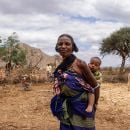Opportunity 3: Inclusive action on adaptation
Climate adaptation means taking action to respond to the immediate impacts of climate change. For example, insulating buildings better to adapt to higher temperatures. Action on adaptation though needs to be informed by those most affected. This is why older people who are most susceptible to harm from climate impacts, like heatwaves and natural disasters, need to be included in climate adaptation planning. Their knowledge and lived experiences are essential for designing community resilience strategies.
Adaptation work is urgent and can be life-saving, but it is also often under-funded and under-prioritised. At COP30, governments will also be finalising the ‘Global Goals for Adaptation’. There is a risk that older people and age-inclusive adaptation measures could be left out of the response.
Age International is calling for older people to be included in adaptation responses, and to integrate age-friendly adaptation measures into the goals. Better recognition of unpaid care work, infrastructure that is adapted to ageing populations, and age-inclusive social protection systems would go far in mitigating the impacts of climate change and improve the lives of people of all ages.
During this summer’s heatwave, Age International launched a campaign action calling on the UK Government’s Climate Minister to include older people in climate change adaptation plans, and 524 MPs across the country were contacted by their constituents about this issue. We renew our calls to the Government to listen to the concerns of the UK public. As COP30 approaches, let’s use the opportunities of a multigenerational approach to ensure climate action is truly inclusive of the rights, needs and voices of older people.
